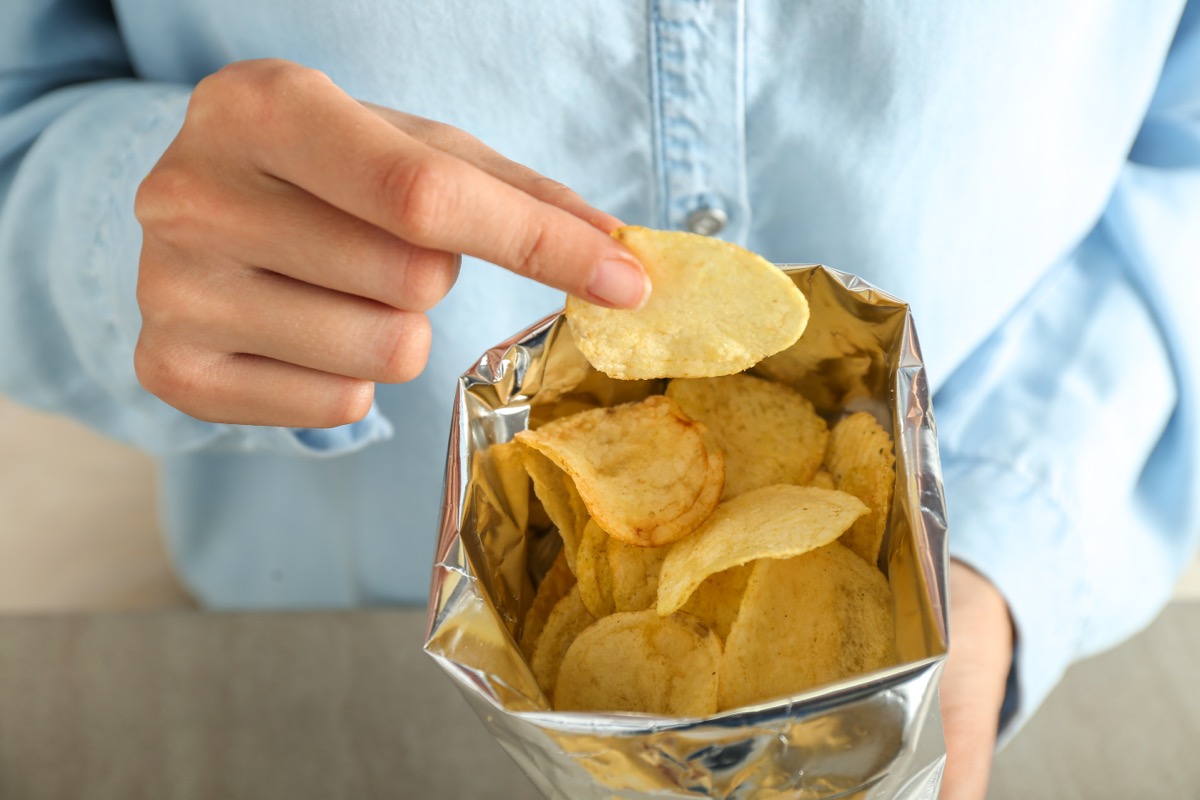Eating Habits to Avoid If You Don't Want High Cholesterol

You've likely heard the advice to "keep your cholesterol levels" low, but do you know why? While it is true that our bodies need cholesterol, high levels have been shown to increase our risk of heart disease. This is because fatty deposits hang on in your blood vessels, eventually limiting the blood flow to your arteries. As you can imagine, this isn't beneficial for your health, so it's wiser to adopt better practices.
Here, we spoke with nutritional experts about the eating habits to avoid if you don't want high cholesterol. From limiting saturated fat to getting up and movin', these strategies will help you maintain your vitality and longevity. Then, be sure to read up on our list of the 100 Unhealthiest Foods on the Planet.
Avoid eating saturated fat.

Rather than stocking up on foods that are high in saturated fat—think: cakes, pastries, bacon, and so on—try to stick to a plant-based diet. Unhealthy, calorie-dense foods don't benefit our overall digestive system and can lead to health conditions. A diet that's full of fresh vegetables and fruits offers us antioxidants that have been shown to prevent LDL cholesterol from becoming problematic, explains Serena Poon, a certified nutritionist, and celebrity chef.
"If you do decide to make a shift to plant-based eating, make sure to stick to eating whole, fresh vegetables and fruits, whole grains, and nuts and legumes," she says. "Packaged vegan foods tend to be high in sodium and other ingredients that may cause inflammation. Eat a wide variety of colors of vegetables and fruits to gather the greatest benefit."
Avoid drinking too much alcohol.

Poon says alcohol has a complicated relationship with cholesterol. As with all vices, anything in moderation can be beneficial for our health. However, when we overdo it, it has the opposite impact. With booze, that's anything over one a drink a day for women or two drinks a day for men.
"Alcohol consumption can be hard on your body on a few different levels, so I usually recommend that people enjoy very moderate amounts of alcohol," Poon says. "Almost everyone I work with who has cut back on alcohol consumption has reported feeling great, along with a balance of a number of biomarkers, including lower overall cholesterol."
Along with affecting your cholesterol levels, Here's What Happens to Your Liver When You Drink Alcohol.
Avoid processed, refined foods.

You may love your fast food fix or your weekly dozen doughnuts, but it's better to steer clear of processed, refined foods that have carbohydrates and added sugars, says Dr. Josh Axe, D.N.M., C.N.S, D.C., the founder of Ancient Nutrition. When you regularly eat these foods, you will likely see an increase in your levels of triglycerides and a decrease in high-density lipoprotein cholesterol.
"Although carbohydrates provide fuel for the body and they're needed for healthy energy levels, they shouldn't make up more than 60% of your diet," he says. "And when you are adding carbohydrate foods to your diet, they should be complex, nutrient-dense carbs, like sweet potatoes, bananas, legumes, quinoa, and buckwheat."
Avoid a sedentary lifestyle.

If you're working from home or you are chained to a desk day-in and day-out, getting enough exercise may be an ongoing uphill battle. But if you need another nudge to watch a Netflix show while walking on a treadmill, here's one from Poon: fitness has been shown effective at countering high cholesterol.
Remember, you don't have to run a marathon to keep your limbs in motion. Instead, Poon suggests finding an activity you enjoy, and you look forward to engaging in regularly.
"Be it cycling, hiking, fencing, or playing soccer, moving your body will support health. Partaking in an activity that you love will help you maintain the habit of moving your body," she adds.
Here's The Single Most Effective Way to Work Out Every Day, Say Psychologists.
Avoid prolonged, untreated stress.

Though we all experience times in our lives that are more hectic and taxing than others, stress is something that needs to be treated. As Poon says, when we experience chronic stress levels, it becomes a risk factor for increased cholesterol.
"It is also true that stress can contribute to lifestyle choices that are risk factors for high cholesterol, such as poor diet, alcohol overconsumption, and lack of exercise," she says. "Learning to reduce stress and tension is truly one of the most important skills to have in your wellness toolbox."
Avoid a fiber-less diet.

Though it's not a bad idea to fill your plate with bountiful veggies and fruits, you could be a tad more strategic and pick fiber-rich foods. As Poon says, fiber has been shown to lower our cholesterol levels. Goodies from nature include nuts, beans, oat bran, whole grains, and vegetables and fruits.
"Vegetables give you the added benefit of supplying your body with antioxidants and phytonutrients that support vibrant health," says Poon. "As you begin to feel better and more enlivened, you might feel inclined to start experiencing new and exciting plant foods."
For even more healthy eating tips, read these next:








